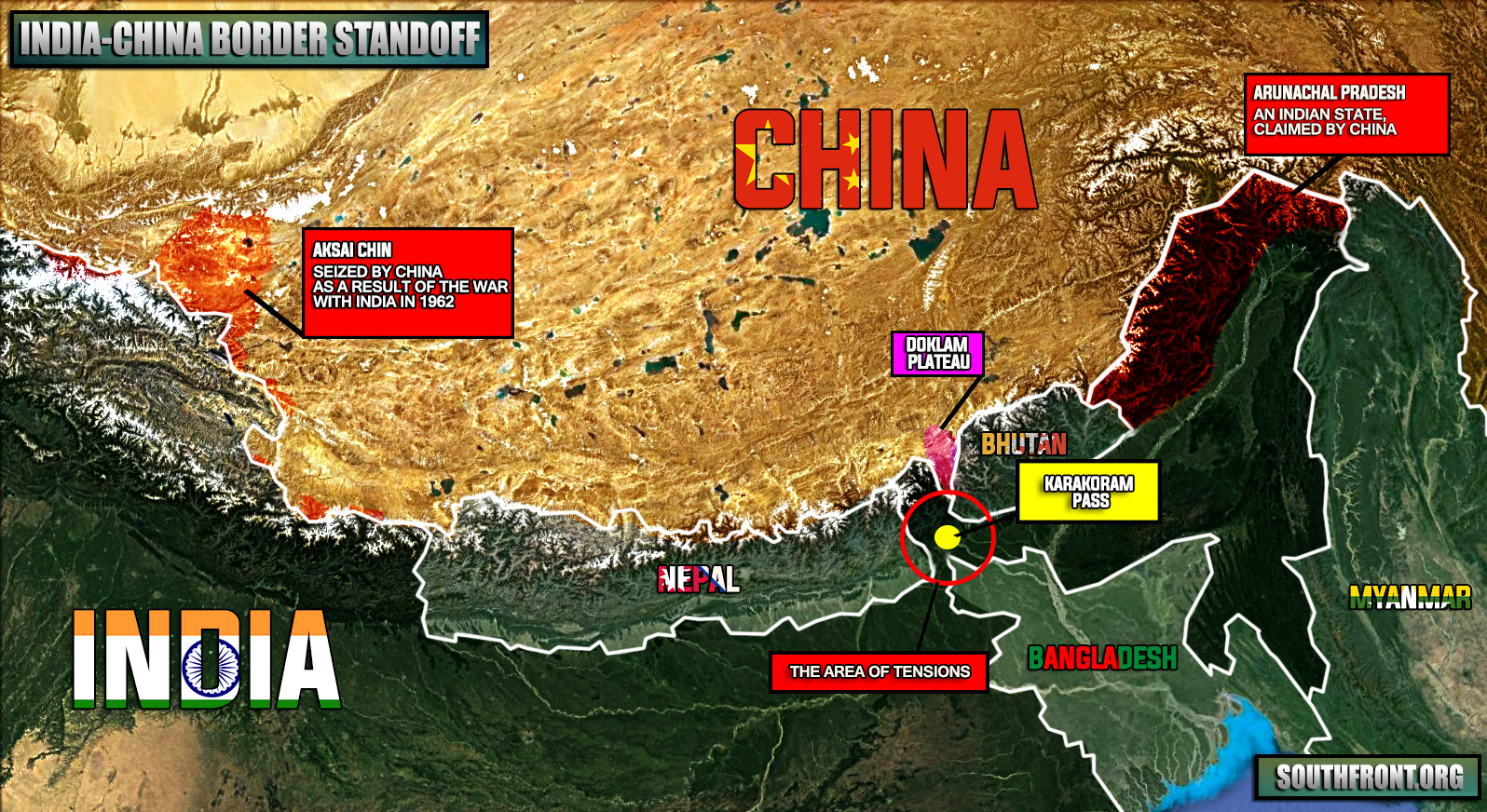www.aljazeerah.info
Opinion Editorials, January 2018
Archives
Mission & Name
Conflict Terminology
Editorials
Gaza Holocaust
Gulf War
Isdood
Islam
News
News Photos
Opinion Editorials
US Foreign Policy (Dr. El-Najjar's Articles)
www.aljazeerah.info
China Slams Indian Army Chief for Remarks on Doklam Border Dispute By Abdus Sattar Ghazali Al-Jazeerah, CCUN, January 16, 2018 |
 |
 |
|
China on Monday (Jan 15) slammed comments by the Indian Army chief General Bipin Rawat for calling Doklam a disputed territory. Chinese Foreign Ministry spokesman Lu Kang said his “unconstructive” comments not helpful for maintaining peace at the borders.
Responding to Gen Rawat’s comments, Lu Kang said his comments were against the consensus reached between Prime Minister Narendra Modi and President Xi Jinping at the BRICS summit last September to revive the ties and preserve peace on the border.
During last week’s press conference, General Rawat had said that India needed to shift its military focus from its western border with Pakistan to its northern border with China. He had also observed that if China was strong, India was not weak either.
“During the past one year, relations between China and India witnessed some twists and turns,” Chinese Foreign Ministry spokesperson Lu Kang said in response to a question.
He underscored that in September, the leaders of India and China reached some important consensus on properly handling the differences and promote China-India relations.
“Recently, two sides enhanced dialogue on consultations, and bilateral relations have shown sound momentum of improvement and development,” he said, in an obvious reference to the visit to India by the Chinese foreign minister Wang Yi and State Councilor and Politburo member Yang Jeichi.
“Under such background, the unconstructive remarks by the Indian senior officials not only go against the consensus reached by the two heads of state, and do not conform to the efforts made by the two sides to improve and develop bilateral relations.” He added: “It cannot help to preserve tranquility and peace in the border areas.”
Doklam border dispute
According to the Hindu newspaper, when asked to spell out any specific remark of Gen. Rawat that had irked China, Mr. Lu said: “I have made myself clear. If the senior official according to the report referred to Donglang (Doklam), I think you are clear about our position - Donglang belongs to China and has always been in the effective jurisdiction of China.”
“The China border troops patrolling and stationed in the area are exercising our sovereignty rights. We hope the Indian side has learned the lessons of history and will avoid similar accidents to take place again,” Mr. Lu observed.
He added: “If he refers to the situation in the whole India-China boundary, I have also said that last September the two heads of state have reached important consensus during the Xiamen summit. Both sides have maintained effective communication since then.”
“The aim is to enhance strategic mutual trust and create enabling atmosphere for strategic communication. Recently the bilateral relations have shown positive momentum.”
But the remarks of the Indian official “go against the consensus of the states and do not conform to the general trend of improvement of bilateral relations. We believe such kinds of remarks are not conducive to maintaining peace and tranquility in border areas.”
He also reiterated China’s stand that the Sikkim section of the India-China boundary has been delimited by the 1890 “historical convention” between the then British government and China, which Beijing claims settled the boundary in that particular section spanning to about 200 kms.
One of the primary demand of China is the settlement of the boundary in that particular section based on the treaty and that the two sides negotiated for a settlement for the rest of the LAC which spans about 3,488 kms. Both sides have a held a total of 20 rounds of border talks to resolve the issue.
“Donglang is China’s territory. China will continue to exercise its sovereignty rights in accordance with the historical convention and steadfastly uphold its territorial sovereignty,” Lu said.
Army Chief calls for multi-pronged approach to deal with China
Addressing a press conference on January 12, 2018, Indian Army Chief Gen Bipin Rawat called for a multi-pronged approach to deal with an assertive China that includes diplomatic, military and partnerships with other countries in the region.
“We understand China is a powerful country, but we are not a weak nation… Dealing with China is a whole of government approach. Diplomatic engagement with China is happening well… Focus has to shift to the northern borders, for too long we have focused on the western borders. We should start preparing for the next kind of warfare, which are cyber and space,” Gen Rawat said at a press conference ahead of Army Day.
Gen Rawat also called for consistent focus on the neighborhood as part of building partnerships with like-minded countries.
“We are not getting into alliances but we are seeking support of other group of nations in the region so that we are not isolated against an assertive China. We are looking at diplomatic, military and partnering with countries in the region. We cannot let our neighbourhood drift away from us,” he observed.
Speaking about China-India 73-day tense standoff at Dokalam in the Sikkim sector which ended on August 28,Geneneral Rawat said China had been constructing roads in north Doklam for many years and last June they came with large amount of equipment and soldiers, forcing India to intervene.
“Our impression was they looked like changing the status quo. With China we have an agreement to not change status quo... This was a change of status quo by bringing the road down, so we intervened,” he said.
''The troop strength has gone down recently either due to winter or because they wanted to de-escalate. Tents and observation posts remain, a lot of which are temporary structures. We have seen a reduction in manpower. They may come back here after winter or somewhere else. Should they come again, we will see what to do,” he stated.
General Rawat also warns Pakistan
In the same press conference, General Rawat also said that his forces are ready to call Pakistan's "nuclear bluff" and cross the border to carry out any operation if asked by the government. "We will call the (nuclear) bluff of Pakistan. If we will have to really confront the Pakistanis, and a task is given to us, we are not going to say we cannot cross the border because they have nuclear weapons. We will have to call their nuclear bluff." Gen. Rawat was responding to a question during a press conference on possibility of Pakistan using its nuclear weapons in case the situation along the border deteriorates.
Not surprisingly, reacting to the statement, Pakistan’s Foreign Minister Khawaja Muhammad Asif wrote on Twitter: "Very irresponsible statement by Indian Army Chief, not befitting his office. Amounts to invitation for nuclear encounter. If that is what they desire, they are welcome to test our resolve. The general's doubt would swiftly be removed, inshallah."
At the same time, the Pakistan Army on Saturday warned India against any misadventure, asserting that the country's nuclear weapons were exclusively meant to foil any threat emanating from the east.
***
An organ of the American Institute of International Studies (AIIS), Fremont, CA Since July 2008
The Journal of America Team: Editor in chief: Abdus Sattar Ghazali Managing Editor: Mertze Dahlin Senior Editor: Prof. Arthur Scott
***
Share the link of this article with your facebook friends
|
|
|
|
||
|
||||||


